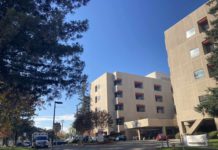*Editor’s note: After press time, this issue was debated by the Town Council, which voted 3-2 to retain 7-person makeup of the commission (with Mayor Matthew Hudes and Councilmember Mary Badame voting against).
As a current member of the Los Gatos Community Health and Senior Services Commission (CHSSC), I write this column on my own behalf not in my official capacity but as someone deeply familiar with the challenges and value of the commission’s work.
Town staff recently recommended reducing the CHSSC to just five voting members. The proposal includes no substantive rationale explaining why this reduction is needed, how it would affect the commission’s ability to manage its workload, or whether other, less drastic alternatives were considered. The recommendation appears arbitrary and, if adopted, risks severely compromising the commission’s ability to serve the needs of Los Gatos residents.
In an earlier column, “Is Red Tape stalling senior services,” I outlined how new procedural hurdles have already slowed down key initiatives requiring staff or Town Council preapproval for actions the commission previously handled directly. These delays have impacted everything from survey coordination to follow-up with mental health providers, creating inefficiencies and confusion. Adding a reduction in commission size on top of these existing barriers threatens to further erode the commission’s effectiveness at a time when demand for services is increasing.
The CHSSC’s record of impact
The CHSSC has a track record of meaningful achievements. Our commission has played a central role in launching and maintaining vital programs and resources for older adults and vulnerable populations. These include:
- The HUB — a centralized resource created in partnership with Los Gatos-Saratoga Recreation to connect residents with services and programs that support daily living, social connection, and health.
- The Navigator — an initiative to help seniors access digital resources and essential services.
- The Senior Services Road Map — a strategic plan that led to the hiring of a Senior Services Coordinator and continues to guide local service development.
- Mental Health Services Report — a 2023 study that included provider interviews and policy recommendations to strengthen mental health support in town.
- Volunteer Matching Hub — a second HUB in development to link community members with local nonprofits and organizations in need of support.
- Oversight of Capital Improvements — ensuring upgrades to the LGS Recreation Center aligned with the needs of seniors.
- Senior Housing Inventory — a reference tool for residents and policymakers.
This work demands broad engagement, consistent oversight, and sustained effort. It cannot be done well with a bare-bones commission.
The risks of downsizing
Cutting the commission to five voting members carries multiple negative consequences:
- Reduced Capacity – Fewer commissioners means fewer people to lead projects, join subcommittees, and attend public meetings, leading to delays and reduced output.
- Loss of Diversity – Each commissioner brings a distinct background and perspective. Reducing numbers will narrow the range of ideas and solutions considered.
- Diminished Community Representation – With fewer members, it becomes harder to reflect the town’s full spectrum of voices and needs.
- Increased Burnout – A smaller team must absorb the same workload, which can lead to volunteer fatigue and higher turnover.
- Weakened Oversight – Fewer commissioners provide less scrutiny of service delivery and policy development, increasing the risk of errors or groupthink.
- Loss of Institutional Knowledge – Long-serving commissioners carry critical context that helps avoid repeating past mistakes. Downsizing increases the risk of losing that knowledge.
- Lower Public Confidence – A smaller, overstretched commission may appear less transparent and responsive to public input.
- Procedural Hurdles – Maintaining a quorum becomes more difficult with fewer members, increasing the likelihood of canceled meetings and stalled decisions.
The big picture: Trust and empowerment
The irony is that, as detailed in my earlier article, the commission’s work has already been slowed by new bureaucratic procedures and the unexpected departure of the Senior Services Coordinator (a new coordinator was just hired). A structural cut to our membership now would compound these challenges.
The CHSSC has shown consistent collaboration and high productivity. Instead of diminishing our capacity, the Town should be exploring ways to strengthen and support it, whether through broader recruitment, better administrative support, or enhanced autonomy to carry out approved initiatives.
A call to preserve community voice
Reducing the number of commissioners will make the work more difficult and the process less efficient. At a time when demand for senior and health services grows, we need more community engagement, not less.
I respectfully urge the Policy Committee and Town Council to reject this recommendation and preserve, or even expand, the CHSSC’s membership. Our town deserves a fully empowered commission capable of continuing its critical work on behalf of all Los Gatos residents.










